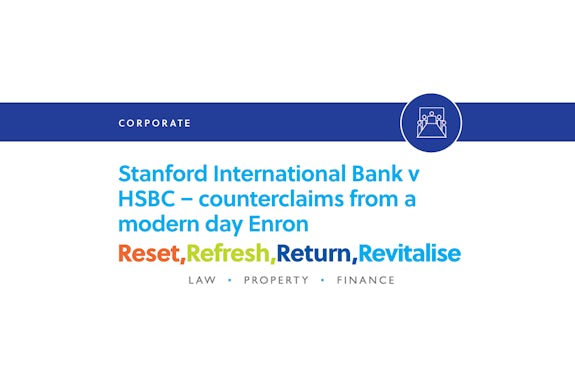By Gilson Gray
March 5, 2021

When you hear the term “Ponzi scheme”, you probably think of the Enron scandal and white collar criminals like Bernie Madoff. But what is a Ponzi scheme? In short, it is a fraudulent investing scam promising high rates of return with little risk to investors. The Ponzi scheme generates returns for early investors by acquiring new investors.
One of the most high profile Ponzi schemes of recent years involved a company called Stanford International Bank (SIB). This was an investment bank incorporated in Antigua, which issued certificates to investors in return for cash. Funds paid to existing investors for redeemed certificates were paid from new investors’ subscriptions (as opposed to investment returns). In other words, it was a classic Madoff-style Ponzi scheme on an enormous scale – new money paying off old debt, rinse and repeat.
SIB became insolvent and liquidators were appointed in 2009, with the liquidation ongoing. During the course of the process, the liquidators brought an action against HSBC in the High Court in England claiming that HSBC had breached its “Quincecare duty of care” to SIB by authorising payments of circa £118 million to existing investors (from new investors’ subscriptions). The liquidators argued that HSBC failed to take sufficient care when authorising these fraudulent transactions.
So what is the Quincecare duty of care? The term comes from the case of Barclays Bank v Quincecare. Quincecare’s chairman sought to draw down £340,000 from the company’s Barclays facility for his own purposes. The bank then sued the company when it did not repay the drawn down amount. Quincecare counterclaimed on the basis that Barclays breached its duty by authorising the fraudulent drawdown. Although the court found in favour of Barclays, the leading judgment held that a banker should exercise caution when he has reasonable grounds for believing that a payment could be an attempt to misappropriate funds.
The SIB case has not reached final judgment as yet. In a preliminary hearing, the court deemed that the position could depend on the solvency position of SIB on the dates when payments were authorised. If SIB was deemed solvent, then it would be difficult to argue losses had arisen: a payment authorised would reduce the company’s assets but also reduce its liabilities (having a balance sheet neutral effect). If the company was insolvent (particularly in the case of SIB, which was alleged to owe many billions of dollars) then the sum of £118 million was unlikely to have a great effect on the financial position of the company: £118 million was a drop in the ocean. However, SIB sought to argue that the funds could have been of benefit to the liquidators: a fighting fund, to utilise in pursuing claims (against ex-directors, company debtors, or its bankers).
We will eagerly await final judgment from this case. However, the arguments and preliminary decision make it clear that a banker must exercise caution when authorising payments from and to its clients so as to avoid fraudulent transactions.
If you would like further information on the topic discussed in this blog, please contact Ryan Macready by email: rmacready@gilsongray.co.uk or by phone: 0141 370 8123. You can also visit our Corporate Team page by clicking here.
The information and opinions contained in this blog are for information only. They are not intended to constitute advice and should not be relied upon or considered as a replacement for advice. Before acting on any of the information contained in this blog, please seek specific advice from Gilson Gray.

Derek specialises in advising owner-managers in connection with finance, contracts and structural issues and has exceptional knowledge of international contract law.